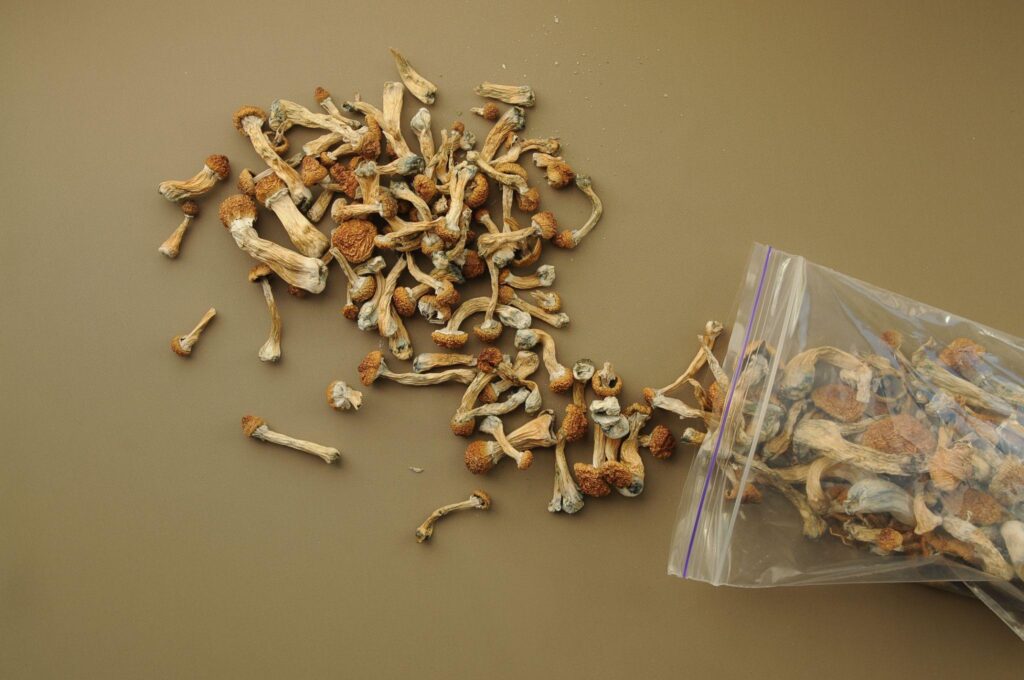Magic mushrooms, or “shrooms,” are wild or cultivated mushrooms that contain a psychoactive and hallucinogenic compound called psilocybin. While shrooms have been used for thousands of years for spiritual and medicinal use, they’re illegal in most places, and using them comes with risks.
Ahead we’ll look at the risks and side effects of shrooms and explore what to do if you’re addicted to magic mushrooms or using them in problematic ways.
What Do Shrooms Do?
Also known as shrooms, mushies, liberties, and golden tops, magic mushrooms are hallucinogenic drugs. This means they can cause you to see, hear, or feel things that aren’t there.
Depending on how much you take and your body’s reaction to psilocybin (the main psychoactive compound in magic mushrooms) you could experience a mild trip or a frightening experience marked by hallucinations and panic.
The physical effects of psilocybin mushrooms can include:
- Dilated pupils
- Drowsiness
- Muscle weakness
- Increased heart rate
- Changes in blood pressure
- Elevated temperature
- Nausea
- Yawning
- Lack of coordination
The mental effects of psilocybin mushrooms can vary based on the dose you take, your physiology, and even the environment you’re in. Common short-term effects can include:
- Hallucinations – Visual or auditory distortions
- Euphoria – Intense feelings of happiness or well-being
- Altered perception of time – Time may seem to slow down or speed up
- Sensory changes – Colors may seem brighter and sounds clearer
- Mood changes – Rapid shifts between different emotions
- Impaired judgment – Trouble distinguishing between reality and hallucinations
- Panic reactions – Feelings of terror that come on suddenly
- Paranoia – Feelings of intense irrational distrust or suspicion
- Psychosis – Hallucinations or false ideas about where/who you are
Long-Term Effects of Magic Mushrooms
While more research is needed, it has been reported that people can experience lasting, long-term effects from using magic mushrooms. This can include flashbacks or even changes in personality.
With heavy, prolonged use of magic mushrooms, some people may develop hallucinogen persisting perception disorder (HPPD), which involves recurring visual disturbances. People with mental health conditions may be more likely to experience complications when using psilocybin mushrooms.
Are Magic Mushrooms Addictive?
Magic mushrooms are not considered physically addictive in the same way as substances like alcohol or opioids. But it’s possible to develop a tolerance to shrooms, meaning you need more of the drug to achieve the same effect. This can increase your chances of having a negative or potentially dangerous experience, like hallucinations or a psychotic episode.
Even though mushrooms aren’t considered physically addictive, you may become psychologically addicted to them, meaning you develop an emotional reliance on the drug. If you are regularly using mushrooms to escape or disengage from the world, it’s important to understand why and get help.
Getting Help for Problem Use of Magic Mushrooms

If you or someone you know is struggling with magic mushroom use—especially in combination with other substances, like alcohol, marijuana, opioids, or other hallucinogens—treatments are available to help.
Educate yourself about the risks and side effects of psilocybin mushrooms, join a support group, or get help from a licensed recovery center.
Adelante Recovery Center: Your Partner in Healing
Adelante Recovery Center offers personalized treatment for substance use disorders. Our drug rehabilitation programs are led by an outstanding team of clinicians and addiction specialists who work together to create individualized treatment plans for our clients.
Our Southern California treatment center in beautiful Corona del Mar is conveniently located for clients in Los Angeles and Orange County and features luxury amenities in a home-like setting.
Overcoming addiction can be a challenging journey, but it’s possible with the right help, support, and resources. If you or a loved one is struggling, Adelante is ready to help.

